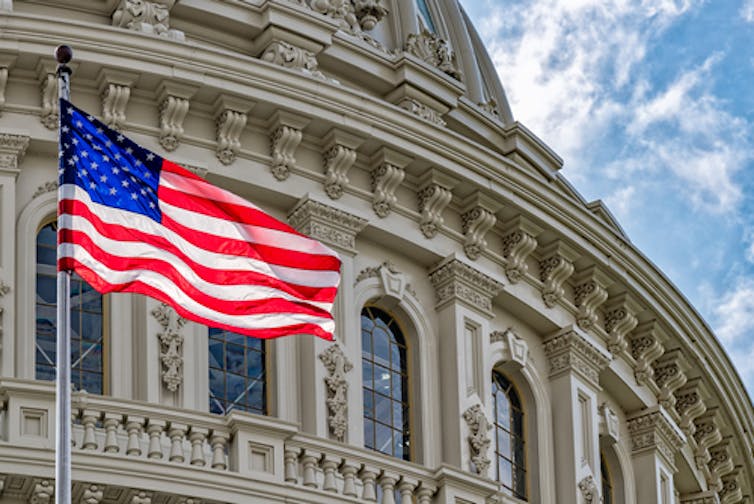Politicians from the main parties in the UK and Germany post far fewer links to untrustworthy websites on Twitter, and this has remained constant since 2016, according to our new research. In contrast, US politicians posted a much higher percentage of unreliable content in their tweets, and this share has increased significantly since 2020.
We also found systematic differences between parties in the US, where Republican politicians were found to share unreliable websites more than nine times more often than Democrats.
For Republicans overall, about 4% (one in 25) of links were unreliable compared to about 0.4% (one in 250) among Democrats, and that gap has widened in recent years. As of 2020, more than 5% of Republican tweets contained links to unreliable information. Democrats have remained consistent and mostly share information that is reliable.
Over the five-year period we studied, elected UK MPs shared just 74 links to disinformation (0.01%), compared to 4,789 (1.8%) of elected US mainstream politicians and 812 (1.3%) by German politicians.
Building on previous work that showed how former US President Donald Trump could set the political agenda using Twitter, we conducted a systematic examination of the accuracy of parliamentarians’ tweets in three countries: the US, the UK and Germany.
Together with colleagues David Garcia, Fabio Carrella, Almog Simchon and Segun Aroyehun, we collected all available tweets from former and current members of the US Congress, the German parliament and the British parliament. In total we collected more than 3 million tweets posted from 2016 to 2022.
To determine the credibility of information shared by politicians, we extracted all links to external websites contained in the tweets and then used the NewsGuard database to assess the credibility of the domain it links to.
NewsGuard curates a large number of sites in many different countries and languages and rates them according to nine criteria that characterize responsible journalism – for example, whether a site publishes corrections and whether it distinguishes between opinion and news.
Our team looked at MPs from the UK Conservative and Labor parties and from Germany (Greens, SPD, FDP, CDU/CSU) as well as US Republican and Democrat politicians.
Members of conservative parties in Germany (CDU/CSU) and the United Kingdom (Conservatives) shared links to unreliable websites more often than their centrist or center-left counterparts. However, even conservative parliamentarians in Europe were more accurate than US Democrats, with only about 0.2% (one in 500) of links from European conservatives being unreliable.
We repeated our analyzes using a second news site credibility database instead of NewsGuard. This robustness check was important to minimize the risk of potential partisan bias in what is considered “unreliable”.
The second database was compiled by academics and fact checkers such as Media Bias/Fact Check. Safely, the results were consistent with our main analysis and we find the same trends.
Read more: Three reasons why misinformation is so widespread and what we can do about it
The world has been abuzz with concern about the state of our political discourse for many years now. There is ample justification for this concern, given that 30%-40% of Americans believe the baseless claim that the 2020 presidential election was “stolen” by President Biden, and given that around 10% of the British public believe in at least one conspiracy theory about COVID-19.

Andrea Izzotti/Shutterstock
Much of the discussion of the problem of misinformation—and much of the blame—has focused on social media, and in particular the algorithms that curate our news and that can push us toward increasingly extreme and provocative content. There is now considerable evidence that social media has been harmful to democracy in at least some countries.
However, social media is not the only source of the disinformation problem. Donald Trump made more than 30,000 false or misleading claims during his presidency, and there are political leaders in Europe who have a poor track record.
However, compared to the abundance of research that has focused on the role of social media and the relationship between technology and democracy in general, there have been few attempts to systematically characterize the role of political leaders in the dissemination of low-quality information.
Our results are interesting in light of several recent analyzes of the American public’s news diet, which have consistently shown that conservatives are more likely to encounter and share unreliable information than liberals. To date, the origin of this change has remained controversial.
Our results contribute to a possible explanation if we assume that what politicians say sets the agenda and resonates with members of the public. By spreading disinformation, Republican members of Congress not only directly provide disinformation to their followers, but also legitimize the sharing of unreliable information in general.




